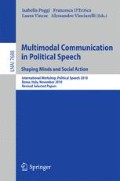Abstract
In this paper we present the new release of CORPS (CORpus of tagged Political Speeches) that contains transcripts of political speeches tagged with audience reactions, such as APPLAUSE or LAUGHTER. The corpus has been built with the goal of allowing automatic processing of the stored data. These tags signal hot-spots about persuasive communication and can be usefully employed in many theoretical and applied fields, providing insights well beyond those of traditional word-count approaches. After introducing the main characteristics of the corpus and some quantitative descriptions, we discuss possible uses of this resource.
Access this chapter
Tax calculation will be finalised at checkout
Purchases are for personal use only
Preview
Unable to display preview. Download preview PDF.
References
Atkinson, J.: Public speaking and audience response: some techniques for inviting applause. In: Structures of Social Action, pp. 370–409. Cambridge University Press, Cambridge (1984)
Benoit, K., Laver, M.: Estimating Irish party positions using computer wordscoring: The 2002 elections. Irish Political Studies 17(2) (2003)
Bertoldi, N., Brugnara, F., Cettolo, M., Federico, M., Giuliani, D.: Cross-task portability of a broadcast news speech recognition system. Speech Communication 38(3-4), 335–347 (2002)
Bevitori, C.: Engendering conflict? A corpus-assisted analysis of women MPs positioning on the war in Iraq. Textus 20(1), 137–158 (2007)
Bligh, M.C., Kohles, J.C., Meindl, J.R.: Charisma under crisis: Presidential leadership, rhetoric, and media responses before and after the September 11th terrorist attacks. The Leadership Quarterly 15(2), 211–239 (2004)
Bull, P., Noordhuizen, M.: The mistiming of applause in political speeches. Journal of Language and Social Psychology 19, 275–294 (2000)
Conoscenti, M.: The Reframer: An Analysis of Barack Obama’s Political Discourse (2004-2010). Bulzoni, Roma (2011)
Cousins, K., Mcintosh, W.: More than typewriters, more than adding machines: Integrating information technology into political research. Quality and Quantity 39, 581–614 (2005)
Dyson, S.B.: Text Annotation and the Cognitive Architecture of Political Leaders: British Prime Ministers from 1945-2008. Journal of Information Technology & Politics 5(1), 7–18 (2008)
Franzosi, R.: From Words to Numbers: Narrative, Data, and Social Science. Cambridge University Press, Cambridge (2004)
Guerini, M., Strapparava, C., Stock, O.: Corps: A corpus of tagged political speeches for persuasive communication processing. Journal of Information Technology & Politics 5(1), 19–32 (2008)
Guerini, M., Strapparava, C., Stock, O.: Valentino: A tool for valence shifting of natural language texts. In: Proceedings of LREC 2008, Marrakech, Morocco (2008)
Heritage, J., Greatbatch, D.: Generating applause: a study of rhetoric and response at party political conferences. American Journal of Sociology 92, 110–157 (1986)
Hermann, M.G.: Assessing leadership style: trait analysis. In: The Psychological Assessment of Political Leaders, pp. 178–214. Lawrence Erlbaum Publishing Co. (2003)
Hu, Q., Goodman, F., Boykin, S., Fish, R., Greiff, W., Jones, S., Moore, S.: Automatic detection, indexing, and retrieval of multiple attributes from cross-lingual multimedia data (2008)
Jing, H.: Usage of wordnet in natural language generation. In: Harabagiu, S. (ed.) Proceedings of the Conference on the Use of WordNet in Natural Language Processing Systems, pp. 128–134. Association for Computational Linguistics, Somerset (1998)
Klebanov, B.B., Diermeier, D., Beigman, E.: Automatic Annotation of Semantic Fields for Political Science Research. Journal of Information Technology & Politics 5(1), 95–120 (2008)
Laver, M., Benoit, K.: Locating tds in policy spaces: Wordscoring Dail speeches. Irish Political Studies 17(1) (2002)
Laver, M., Benoit, K., Garry, J.: Extracting policy positions from political texts using words as data. American Political Science Review 97(2), 311–331 (2003)
Laver, M., Garry, J.: Estimating policy positions from political texts. American Journal of Political Science 44(3), 619–634 (2000)
Poggi, I., Vincze, L.: Gesture, gaze and persuasive strategies in political discourse. In: Kipp, M., Martin, J.-C., Paggio, P., Heylen, D. (eds.) Multimodal Corpora. LNCS, vol. 5509, pp. 73–92. Springer, Heidelberg (2009)
Purpura, S., Hillard, D.: Automated classification of congressional legislation. In: Proceedings of the Seventh International Conference on Digital Government Research, San Diego, CA (2006)
Purpura, S., Hillard, D., Howard, P.: A comparative study of human coding and context analysis against support vector machines (svm) to differentiate campaign emails by party and issues (2006)
Strapparava, C., Guerini, M., Stock, O.: Predicting persuasiveness in political discourses. In: Proceedings of the Seventh conference on International Language Resources and Evaluation, LREC 2010 (2010)
Author information
Authors and Affiliations
Editor information
Editors and Affiliations
Rights and permissions
Copyright information
© 2013 Springer-Verlag Berlin Heidelberg
About this paper
Cite this paper
Guerini, M., Giampiccolo, D., Moretti, G., Sprugnoli, R., Strapparava, C. (2013). The New Release of CORPS: A Corpus of Political Speeches Annotated with Audience Reactions. In: Poggi, I., D’Errico, F., Vincze, L., Vinciarelli, A. (eds) Multimodal Communication in Political Speech. Shaping Minds and Social Action. PS 2010. Lecture Notes in Computer Science(), vol 7688. Springer, Berlin, Heidelberg. https://doi.org/10.1007/978-3-642-41545-6_8
Download citation
DOI: https://doi.org/10.1007/978-3-642-41545-6_8
Publisher Name: Springer, Berlin, Heidelberg
Print ISBN: 978-3-642-41544-9
Online ISBN: 978-3-642-41545-6
eBook Packages: Computer ScienceComputer Science (R0)

